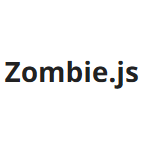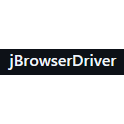
Zombie.js
Zombie.js is a headless browser testing framework designed for Node.js, allowing developers to simulate browser environments for testing client-side JavaScript efficiently. It automates web interactions like form submissions and link clicks. Integrating seamlessly with libraries such as Mocha, it streamlines the process of writing and executing tests, enhancing development workflows.
Top Zombie.js Alternatives
WebKit
WebKit serves as a powerful, open-source web browser engine utilized by applications like Safari, Mail, and the App Store across macOS, iOS, and Linux.
jBrowserDriver
jBrowserDriver is a programmable web browser driver designed for embedding in Java applications, fully compliant with the Selenium WebDriver specification.
HtmlUnit
HtmlUnit serves as a GUI-less browser designed for Java applications, enabling developers to model HTML documents and interact with web pages programmatically.
browserless
Browserless offers an advanced browser automation solution designed to scale effortlessly while eliminating the complexities of maintenance.
PhantomJS
PhantomJS is a headless web browser that executes JavaScript, compatible with Windows, macOS, Linux, and FreeBSD.
trifleJS
TrifleJS is a headless browser tool designed for test automation, utilizing the V8 JavaScript engine to emulate Internet Explorer environments.
ScrapFly
Users can scrape web pages, capture high-quality screenshots, and extract structured data using AI and...
SlimerJS
Operating on Gecko, Firefox's engine, it supports both headless and traditional modes, making it ideal...
Top Zombie.js Features
- Insanely fast headless testing
- Lightweight framework for testing
- Simulated environment without browser
- Seamless integration with Mocha
- Support for custom assertions
- Multi-tab management support
- Access to request/response pipeline
- Cookie management capabilities
- Detailed resource history tracking
- HTTP basic authentication support
- Event-driven architecture for actions
- Customizable browser instances
- Console logging for debugging
- Access to browser state dumps
- Ability to set HTTP Referer header
- Flexible DOM element selections
- Support for promise-based testing
- Easy configuration for localhost testing
- Wildcard domain mapping support
- Comprehensive error tracking system.







